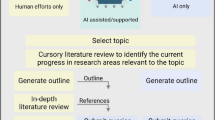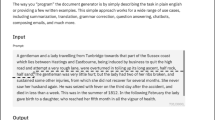Abstract
Currently most literary critics reject the use of science and technology to gain information about texts, while most computer text-analysts have become absorbed in science and technology and forgotten they were seeking information about literature. Whether these two trends will continue into the 1990's remains to be seen; that they explain a good deal about the world we work in now can, I think, be demonstrated. This essay looks at the questions of what literary computing could offer to literary critics, why computer users get lost in scientific jargon, what happens when text becomes input and, most importantly, what happens when text becomes output; it closes with a discussion of why the synthesis will be so difficult.
Similar content being viewed by others
References
Brainerd, Barron. “The Type-Token Relation in the Works of S. Kierkegaard.”Computing in the Humanities. Ed. Richard W. Bailey. Amsterdam: North Holland, 1982.
Booth, Wayne C. The Rhetoric of Fiction. Chicago: University of Chicago Press, 1961.
Ellis, John. The Theory of Literary Criticism. Berkeley: University of California Press, 1974.
Morton, A. Q.Paul, the Man and the Myth. 1966.
Morton, A. Q. Literary Detection: How to Prove Authorship and Fraud in Literature and Documents. New York: Scribner, 1978.
Mosteller, Frederick and David Wallace.Inference and Disputed Authorship “The Federalist.” Reading: Addison-Wesley, 1964.
Meredith, Eunice. “The Use of Rhetorical Analysis to Determine Gender-Related Patterns of Communication in Fiction.” Thesis, Iowa State University, 1984.
Potter, Rosanne G. “Toward a Syntactic Differentiation of Period Style in Modern Drama: Significant Between-Play Variability in 21 English-Language Plays.”Computers and the Humanities, 14 (1980), 187–196.
Potter, Rosanne G. “Character Definition Through Syntax: Significant Within-Play Variability in 21 Modern English-Language Plays.”Style,15 (1981), 415–434.
Potter, Rosanne G. “Reader Response and Character Syntax.”Computing in the Humanities. Ed. Richard W. Bailey. Amsterdam: North-Holland, 1982, 65–78.
Potter, Rosanne G. “Reasonable Computer-Assisted Research on Literary Texts: The Problems of ‘Messy Data Sets.”’Literary Criticism and the Computer. Ed. Bernard Derval and Michel Lenoble. Université de Montréal, 1985, 95–110.
Sabot, C. Ruth. “Focus and Attribution in Ford and Conrad.”Computing in the Humanities. Ed. Richard Bailey. Amsterdam: North-Holland, 1982, 47–58.
Smith, John B. “ARRAS and Literary Criticism.”Literary Criticism and the Computer. Ed Bernard Derval and Michel Lenoble. Université de Montréal, 1985, pp. 79–93.
Author information
Authors and Affiliations
Additional information
Rosanne G. Potter is associate professor in the English Department at Iowa State University, Ames, Iowa 50011.
Rights and permissions
About this article
Cite this article
Potter, R.G. Literary criticism and literary computing: The difficulties of a synthesis. Comput Hum 22, 91–97 (1988). https://doi.org/10.1007/BF00057648
Issue Date:
DOI: https://doi.org/10.1007/BF00057648




